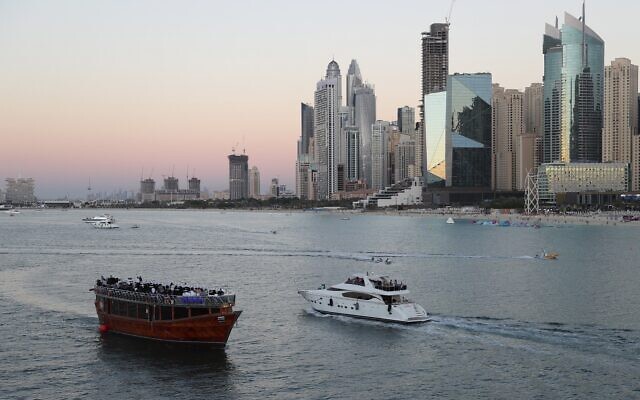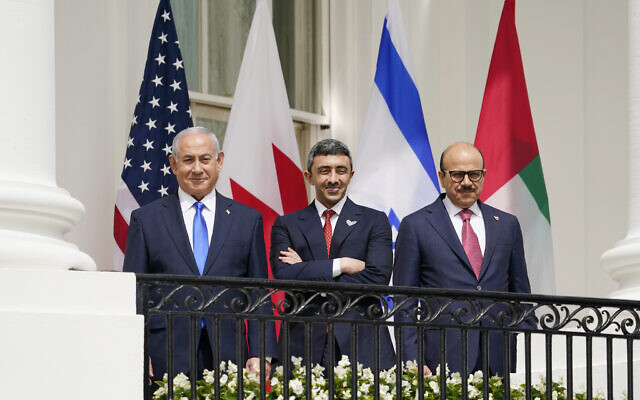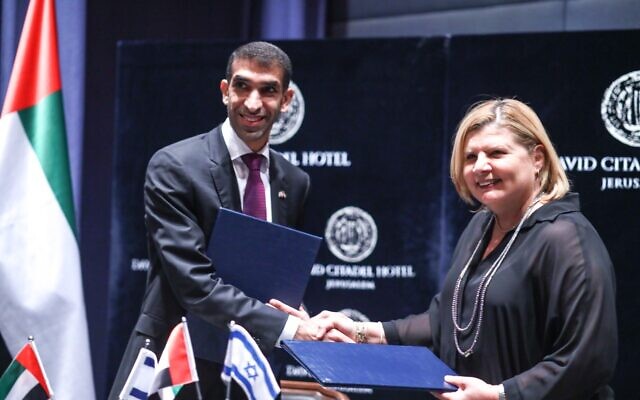[ad_1]
The leader of the UAE’s largest free trade zone pitched hundreds of Israeli entrepreneurs in Tel Aviv on Tuesday, seeking to make Dubai’s multi-commodity hub a welcoming home, a sign that the UAE sees potential in its ties with Israel for Israeli businesses. .
“Israel is both a key stakeholder for DMCC and one of our key target markets,” CEO Ahmed Bin Sulayem said in a speech at the Tel Aviv Stock Exchange.
“These ties are constantly strengthening as our two countries grow closer through new programs and initiatives,” he said.
There are currently 78 Israeli companies operating in the DMCC. Free trade zones offer a range of advantages including no corporate tax, access to Gulf markets and Asia, minimal bureaucracy and cheap labor from India.
Sanjeev Dutta, executive director of commodities and financial services at the DMCC, said Israeli companies in the DMCC can operate as local entities and do business with countries that do not recognize Israel.
Free zones in Dubai have a different legal regime and business laws than the rest of the country.
Bin Sulayem, 44, told The Times of Israel that he sees Israel as a strategic partner, especially in the fields of IT security and water conservation.

Tourists on a yacht pass by a traditional dhow that offers dinner cruises in Dubai, United Arab Emirates, January 12, 2021 (AP Photo/Kamran Jebreili)
Bin Sulayem’s continued engagement with Israeli companies is one reason why DMCC — a sprawling district with more than 75 office buildings and 100,000 people who live and work — is opening a water center.
“It was a little bit inspired by Aqua Index and Watergen,” he explained, mentioning the two Israeli companies.
Aqua Index seeks to turn water into a tradable commodity by setting a standard price for fresh water, while Watergen sells proprietary air-based water generation technology to expand access to potable water.
The 20-year-old DMCC is known primarily for trading commodities, especially diamonds, precious metals, coffee and tea.
Israeli companies in these fields already operate in the free trade zone. The Israel Diamond Bourse opened an office at the DMCC in February, and Bin Sulayem held talks with Israeli supermarket tycoon Rami Levy and Landver Coffee owner Ori Federman months before the Abraham Accords were signed in September 2020.
“There’s a lot of opportunity out there,” said Dror Maoz, managing director of GoldRock International DMCC. “A lot of the diamond industry has moved there.”
After the Abraham Accords, Maoz opened his office in DMCC, citing the duty-free and three-hour direct flight between Israel and Dubai.
Proud to witness the official opening of the representative office of the Israel Diamond Exchange @DMCCAuthority in dubai
Mazal tov and Mabrouk! @ahmedbinsulayem @RabbiElieAbadie @alexpeterfreund @YoramDvash @WFDBTweets @Israel @IsraelArabic @Hayek Amir @Ilan_Sztulman pic.twitter.com/Utv36qW72z– Gate to the East – Shaarei Mizrah (@ShaareiMizrah) February 22, 2022
But Bin Sulayem is determined to attract Israeli companies in other areas. “We’re not just diamonds,” he insisted.
He said he was pleasantly surprised by the diversity of Israeli businessmen who participated in Tuesday’s DMCC “roadshow.”
“I didn’t expect there to be so many techies,” he recalls, pointing to a conversation he had with cryptocurrency and renewable energy entrepreneurs in Tel Aviv.
Israeli leaders’ interest in these areas aligns with DMCC’s priorities. In May 2021, DMCC launched the Crypto Center for its blockchain and crypto businesses.
Bin Sulayem said many of the Israelis he spoke to had little knowledge of the UAE business environment and had come to learn. “It’s more of a direction today,” he said.

Then Prime Minister Benjamin Netanyahu, United Arab Emirates Foreign Minister Abdullah bin Zayed Al Nahyan and Bahraini Foreign Minister Khalid bin Ahmed Al Ha Lifa stands on the Blue Room balcony during the Abraham Accords signing ceremony on the South Lawn of the White House September 15, 2020 in Washington. (AP Photo/Alex Brandon)
Yosef Sara, CEO of real estate with operations in the US, said he came to Dubai to get an initial impression of doing business in Dubai and to make contacts.
“Most of the people I meet feel the same way I do,” he said. “They understand that this is a huge opportunity, and [Dubai] A great event was brought to Israel. “
Sarah is intrigued by the UAE’s rapid economic growth. “They have wealth and we can dream. You see these buildings, it’s unbelievable for someone like me who is passionate about real estate.”
Bilateral trade with the UAE in 2021 is close to $900 million, according to the Ministry of Economy. This year, as of the end of October, trade was over $2 billion, not including software.
Free trade negotiations between the two countries begin in November 2021, resulting in protocol May this year.
Bin Sulayem expects the positive trend to continue, especially with the addition of meat to the bones of the Abraham Accords. “You have waves of entrepreneurs,” he said. “Some want to go to a place that hasn’t been established, whether it’s infrastructure, politics, or both. And some wait until it’s more established.”
He would like to see more Israeli shipping lines partner with Emirati logistics giant DP World, which has terminals in 40 countries on every continent except Antarctica.

Economy Minister Orna Barbivai (right) and UAE Minister of State for Foreign Trade Thani bin Ahmed Al Zeyoudi sign the Israel-UAE Free Trade Agreement (Gideon Sharon/GPO) in Jerusalem
Despite the positive trends, there are still challenges to overcome.
For Bin Sulayem, his task of attracting Israeli companies has not been easy. There are more than 40 free trade zones in Dubai alone, each with its own terms. They are often industry-specific, such as Dubai Internet City for tech companies and Dubai Science Park for the health and pharmaceutical industries.
DMCC competes with many other free zones.
Israel also faces obstacles.
Israelis “don’t know how to do business there,” said an Israeli official, speaking on condition of anonymity.
The official pointed to other challenges, including a lack of financial infrastructure to move money quickly from Israel to the UAE.
Maoz said the mindset of the Israelis is the same as that of many Indian businessmen they deal with in Dubai. However, the cultural differences between Emiratis and no-nonsense Israelis are stark.
“There’s a different way of doing business,” he said. “It’s slower, it’s built more on friendship.”
[ad_2]
Source link